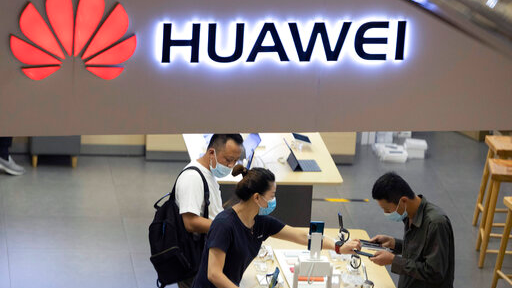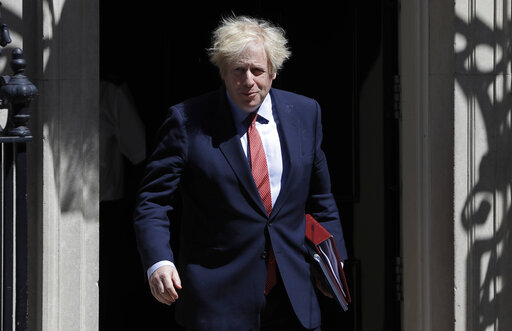
Visitors wearing masks to curb the spread of the coronavirus look at the latest products at a Huawei store in Beijing, July 15, 2020. /AP
Visitors wearing masks to curb the spread of the coronavirus look at the latest products at a Huawei store in Beijing, July 15, 2020. /AP
Editor's note: Jonathan Arnott is a former member of the European Parliament. The article reflects the author's opinions, and not necessarily the views of CGTN.
The British government had a problem. Caught between China and the United States, its position on a number of issues including Hong Kong, Xinjiang, and most recently Huawei, was coming under considerable scrutiny.
Since the UK's original decision on Huawei, the United States has become far more strident in its claims that Huawei will cause a danger to the UK's 5G network – and therefore, it claims a danger to national security.
Whilst the governing Conservative Party enjoys a substantial working majority in Parliament, there are a substantial number of backbenchers willing to rebel and vote against Huawei's involvement. Meanwhile, the UK is keen to strike a trade deal with the United States following the end of the Brexit transition period.
In short, Boris Johnson's government was coming under considerable pressure. It has given way on Huawei under protest; these are the heel-dragging actions of an administration which did not really wish to reverse its position. It fears increased prices for consumers and a delay in the introduction of 5G – neither of which would be good for business as the country begins to recover from the pandemic. Any price increase will be sharply felt by British consumers at this time. Leading a nation which needs to prove its competitiveness in a post-Brexit world, the United Kingdom government was reluctant: today's decision is a sign that it feels it has lost the domestic political argument.

Britain's Prime Minister Boris Johnson leaves Downing Street to attend the weekly session of PMQs in Parliament in London, May 20, 2020. /AP
Britain's Prime Minister Boris Johnson leaves Downing Street to attend the weekly session of PMQs in Parliament in London, May 20, 2020. /AP
Ask yourself what a government would do if it were determined to remove Huawei from their country's network. It would surely take the decision quickly, making sure that the decision would be enforced as soon as possible. It would make the decision as wide-ranging as possible.
In fact, they appear to have done the opposite. Huawei equipment will, of course, still be permitted for 3G and 4G networks. The ban on purchasing new 5G equipment from Huawei will not begin until the end of the year, which leaves it likely that there could be a rush on orders of Huawei kit between now and December. The equipment will be permitted to be used until the end of 2027, seven and a half years from now.
In political terms, it is an eternity. Think back a similar amount of time: seven and a half years ago, we were only just beginning the rollout of 4G in the United Kingdom. By the time Huawei technology is no longer permitted in the 5G network, we are likely to already be rolling out another generation of technology beyond that. During that time, far more information will become known. Another general election will have been held in the United Kingdom.
The decision was, of course, a serious blow for Huawei – that is undeniable. Yet the level of that blow is, if anything, less than would have been expected given that the British media has been almost united in its anti-Huawei coverage in recent months.
Huawei's response is less strident and more measured than might have been expected, possibly reflecting the political reality of the situation, with the company saying: "We will conduct a detailed review of what today's announcement means for our business here and will work with the UK government to explain how we can continue to contribute to a better connected Britain." Such an announcement signifies that they perceive the door to have been left at least slightly open, rather than slammed completely shut in their face.
Finding himself squeezed between the United States and China, Boris Johnson has attempted to do not just the minimum possible to placate the United States – but also the minimum possible to placate the media and his own backbenchers. By doing this, he takes another political gamble: he hopes any response from China will also be kept to a minimum.
(If you want to contribute and have specific expertise, please contact us at opinions@cgtn.com.)